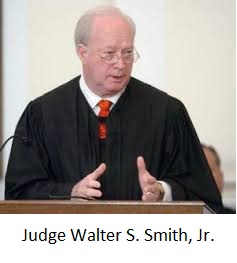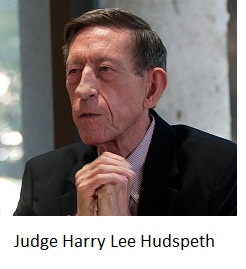 I think the U.S. Justice Department may have set a record today. On Monday, I filed Freedom of Information Act requests with the U.S. Marshals Service for information about scandal-ridden U.S. District Judge Walter S. Smith, Jr. of Waco, Texas. Normally, DOJ takes months or even years to respond to a FOIA request but today, less than 48 hours after submission, I received a letter denying all of my requests across the board. Meanwhile, Congressman Bill Flores seems to have lost all interest in Judge Smith’s misconduct now that his primary election is over (more on that below).
I think the U.S. Justice Department may have set a record today. On Monday, I filed Freedom of Information Act requests with the U.S. Marshals Service for information about scandal-ridden U.S. District Judge Walter S. Smith, Jr. of Waco, Texas. Normally, DOJ takes months or even years to respond to a FOIA request but today, less than 48 hours after submission, I received a letter denying all of my requests across the board. Meanwhile, Congressman Bill Flores seems to have lost all interest in Judge Smith’s misconduct now that his primary election is over (more on that below).
My sources in Waco tell me that Judge Smith is a hot mess these days (even more so than usual), and his behavior leads them to believe that he has started drinking again. You may recall that Judge Edith Jones, formerly the chief judge of the U.S. Court of Appeals, gave Judge Smith an ultimatum several years ago to enter rehab or face suspension. In December, the Fifth Circuit reprimanded him for groping a female deputy clerk in his chambers (apparently while he was drunk). In February, I wrote about evidence that Judge Smith illegally accepted free services from Greg White, a Waco attorney who had several cases pending in front of Judge Smith.
I am aware of many other alleged incidents of misconduct involving Judge Smith, and my FOIA letter included six separate requests:
- All emails between Judge Smith and U.S. Marshals Service personnel as far back as those records are available.
- All records or emails concerning whether Judge Smith made derogatory or threatening comments to or about U.S. District Judge Robert Pitman or any other judge. This request includes, but is not limited to, any emails or records suggesting that Judge Pitman was not welcome in Waco. This request further includes, but is not limited to, added security costs related to Judge Pitman’s travel to Waco.
- All emails to or from Judge Smith that were forwarded to the U.S. Marshals Service by other parties.
- All records maintained by Deputy Arthur Thomas or any other Marshals Service personnel concerning incidents of misconduct, threats, complaints or inappropriate comments by Judge Smith. This request includes, but is not limited to, (1) suggestions that a particular deputy should be fired or transferred; (2) problems related to Judge Smith’s alcohol consumption; or (3) sexual advances toward female courthouse employees.
- All emails or correspondence to or from other judges concerning Judge Smith.
- All records or emails concerning whether Marshals Service personnel were interviewed during the 2014-2015 judicial misconduct investigation of Judge Smith. This request includes, but is not limited to, records or emails concerning whether the judicial misconduct investigators attempted to contact former Marshals Service employee Linda Kay Lusk, a.k.a. Linda Kay Stringer, or whether the investigators attempted to interview any other personnel concerning Ms. Lusk’s experiences with Judge Smith.
Here’s DOJ’s explanation for denying all six requests:
Your request is denied pursuant to exemptions (b)(6) and (b)(7)(C) of the Freedom of Information Act, 5 U.S.C. § 552(b). Exemption 6 allows an agency to withhold personnel, medical and similar files, the disclosure of which would constitute a clearly unwarranted invasion of personal privacy. Exemption 7(C) protects records or information compiled for law enforcement purposes to the extent that the production of such records or information could reasonably be expected to constitute an unwarranted invasion of personal privacy. A discretionary release of such records is not appropriate. See also United States Department of Justice v. Reporters Committee for Freedom of the Press, 489 U.S. 749 (1989).
So if a judge is showing up for work drunk and assaulting women in his chambers, the government thinks it should conceal that information to protect the judge’s privacy? And what does #6 have to do with the judge’s privacy? If privacy was really an issue, the government could redact the names of third parties or even Judge Smith himself.
No, the real issue here is about protecting powerful people from embarrassment, and that pattern goes all the way back to 1998 with Judge Smith, and it continues to this day. At the time I filed the complaint against Judge Smith, I also filed an overlapping complaint against  Senior Judge Harry Lee Hudspeth, who was chief judge of the Western District of Texas at the time of the grab-and-grope incident in 1998. According to the victim in that incident, Judge Hudspeth was informed about the assault but covered it up.
Senior Judge Harry Lee Hudspeth, who was chief judge of the Western District of Texas at the time of the grab-and-grope incident in 1998. According to the victim in that incident, Judge Hudspeth was informed about the assault but covered it up.
The Fifth Circuit opened an investigation of Judge Hudspeth in 2014 at the same time it opened the investigation of Judge Smith, but whereas the Fifth Circuit finished its investigation of Judge Smith in October, the investigation of Judge Hudspeth is still in limbo. Why? Remember that the prime directive of the federal judiciary is to protect the members of the federal judiciary. The judicial investigators always seem to downplay the misconduct of their colleagues, meting out only enough punishment to avoid the appearance of a total whitewash. Maybe they’re thinking the public will forget about Judge Hudspeth’s role in the scandal. Or maybe Judge Hudspeth told other judges and they covered it up, too.
Meanwhile, Chief Judge Carl Stewart of the Fifth Circuit is stonewalling my complaint about Judge Smith accepting free legal services from Greg White. Judge Stewart’s only responsibility was to determine whether my complaint stated a violation of the rules. If so, he was supposed to appoint an investigative panel. If not, he was supposed to dismiss the complaint. Instead, he has held the complaint in limbo for nearly six months.
And let’s not forget Congressman Flores’s role in all of this. In an interview with the Waco Tribune-Herald before the March 1 Republican primary, Congressman Flores talked a good game, indicating that he was looking into impeachment because he thought the reprimand of Judge Smith was insufficient. Since the primary, however, Congressman Flores has gone silent, with his staff ignoring phone calls from me and from the Waco newspaper.
I wish I could say that I am surprised, but I’m not. As I wrote on DirtyRottenJudges.com back in 2014, members of Congress generally don’t show much interest in judicial misconduct, even though Congress is the only entity that can remove misbehaving judges from the bench. Apparently it’s not a very sexy issue, but maybe you can help Congressman Flores refocus his attention. If you’re a constituent, click on this link and give him a little spinal reinforcement via email or letter.